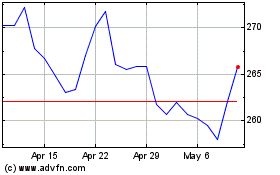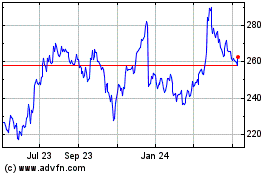Executives world-wide returned to work Wednesday to face a
radically changed political landscape as they weighed the
ramifications of Donald Trump's surprise election win—the second
big shift for global businesses in recent months after the U.K.'s
Brexit vote.
The upset victory by the Republican nominee, who was down in
most polls heading into Election Day, took markets and many
corporate leaders by surprise—and will leave them unsettled, given
the uncertainty behind many of Mr. Trump's policy positions. Shares
of auto makers and some industrial conglomerates fell early
Wednesday, while pharmaceutical companies, some energy firms and
bank stocks rose.
"The market wanted the certainty and clarity of a Clinton win—it
may not agree with all of her policy proposals, but it was
comfortable with gridlock," said Brian Gardner, head of Washington
research for the investment bank Keefe, Bruyette Woods.
Mr. Trump has criticized global trade, the North American Free
Trade Agreement and the Trans-Pacific Partnership, a trade
agreement to lower or eliminate tariffs between the U.S. and 11
other countries including Japan and Vietnam.
Any push by the Trump administration to craft new bilateral
agreements is a potential headache for firms such as General
Electric Co. and Caterpillar Inc. that have supported free trade as
a way to gain access to overseas markets, analysts said.
"Obviously we are concerned about the antitrade rhetoric, a lot
of the antibusiness positions and it's very worrisome," FedEx Corp.
CEO Fred Smith said of both candidates in a recent earnings call.
"But hopefully, after the election cooler heads will prevail."
Global stock markets fell sharply overnight, but the Dow
industrials were largely unchanged, up 0.8% to 18347.86 shortly
after trading opened. The dollar initially sold off against the
euro, yen and sterling in Asian trading but recouped much of those
losses.
In Asia, shares fell sharply in Japanese and South Korean auto
makers such as Toyota Motor Corp., Honda Motor Co. and Nissan Motor
Co., which lean heavily on manufacturing U.S.-bound exports from
Mexico. On the campaign trail, Mr. Trump criticized big U.S.
companies like Ford Motor Co. and United Technologies Corp. for
moving jobs and operations overseas. He threatened to slap 35%
tariffs on cars imported from Mexico.
For many investors and executives, a victory by Hillary Clinton
was expected to provide more immediate clarity despite her
targeting big businesses on the campaign trail—including
pharmaceuticals firms—as ripe for scrutiny.
Big drug stocks shot higher in Europe after being weighed down
for months by the prospect of a pricing crackdown during a Clinton
presidency. And U.S. defense stocks rallied early as the prospect
of a short-term bump in military spending from the incoming Trump
administration outweighed concerns about a possible hit to export
sales.
Mr. Trump has vowed to dismantle the Affordable Care Act—a move
that could hinge on Democrats' ability to block legislation in the
Senate—and to allow health insurers, which currently are regulated
by the states, the ability to compete across state lines. Either
has the potential to upend the U.S. health-insurance market, which
is still coming to grips with the changes wrought by the ACA.
Mr. Trump's election promises relief for U.S. coal miners, a
boost for American oil producers and fresh uncertainty for Western
energy companies' plans to return to Iran.
Whether any of the market moves early Wednesday end up being
knee-jerk reactions, or early signals of which global sectors may
benefit from a Trump presidency, is far from clear. Many of Mr.
Trump's policy statements so far have been vague and open to
interpretation, and he has been known to swerve on positions
radically.
After the election result, more than 1,100 chief executives said
in an open letter to Mr. Trump that he can count on business to
promote "healing and reconciliation."
"To be sure, we are aware that there will be times when we
disagree on the specifics of important policies, and we will
respectfully make our voices heard when we do," they wrote. "We do
believe, however, that we can be constructive—both when we agree
and when we do not—if we can all approach challenging situations in
good faith, guided by an unwavering commitment to a greater
purpose."
The letter was organized by the National Association of
Manufacturers, a major Washington trade group. The signers include
Dennis A. Muilenburg of Boeing Co., Wes Bush, CEO of Northrop
Grumman Corp., David Taylor, CEO of Procter Gamble Co. and Gregory
Hayes of United Technologies Corp.
Mr. Trump has proposed overhauling U.S. corporate taxes by
reducing the corporate rate to 15% from 35%. His plan also provides
for a one-time tax rate of 10% for repatriated corporate profits,
which would help fund plans to spend on new infrastructure
projects.
Mr. Trump's campaign argues that in addition to forestalling
inversions—acquisitions that enable companies to re-domicile
abroad—the plan would accelerate U.S. economic growth.
"His view is if you lower the tax rate at the corporate level,
more money is coming back into the country," said Scott Kaplowitch,
a partner at Edelstein Company LLP. "You would think twice about
investing overseas if the tax rate came down in the U.S."
Mr. Trump has spoken out against media consolidation, saying his
administration would seek to block AT&T Inc.'s proposed $85
billion acquisition of Time Warner Inc. "It's too much
concentration of power in the hands of too few," he said in
October. Shares of Time Warner fell 1.5% to $86.45 early Wednesday,
while AT&T shares were up 0.4% at $37.15.
Alex MacDonald contributed to this article.
Write to Theo Francis at theo.francis@wsj.com, Denise Roland at
Denise.Roland@wsj.com, Andrew Tangel at Andrew.Tangel@wsj.com and
Sean McLain at sean.mclain@wsj.com
(END) Dow Jones Newswires
November 09, 2016 10:55 ET (15:55 GMT)
Copyright (c) 2016 Dow Jones & Company, Inc.
FedEx (NYSE:FDX)
Historical Stock Chart
From Mar 2024 to Apr 2024

FedEx (NYSE:FDX)
Historical Stock Chart
From Apr 2023 to Apr 2024
